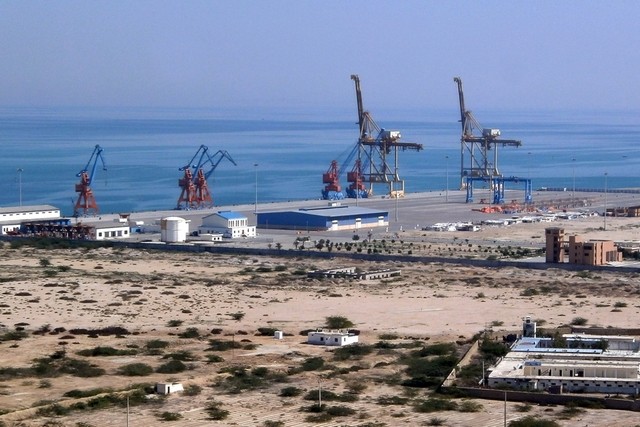
“Whoever controls the Indian Ocean dominates Asia. The ocean is the key to the seven seas. In the 21st century the destiny of the world will be decided on its waters.”
These words – often misattributed to Alfred Thayer Mahan, the most important American strategist of the nineteenth century – seem to be proven right specifically in the context of the current strategic scenario in South Asia.
On April 14, 2015, Pakistan officially handed over operational rights of Gwadar port to China for the next forty years. This significant decision by the Pakistani government had been on the cards for quite a long time. Since China has contributed 80% of the funds for developing and establishing this port; henceforth it will surely play a major operational role in this project. Meanwhile, this agreement between China and Pakistan has not been received very positively by a number of regional and global actors, predominantly by Pakistan’s immediate eastern neighbor, India.
Gwadar port is located on the brink of the Indian Ocean, approximately 120 kilometers away from the Iranian border. The port holds critical status in the naval balance of power in the South Asian region, which demonstrates its strategic significance. This is the third deep-sea port in Pakistan and will provide huge economic and strategic benefits to the country. The port is located just outside the Strait of Hormuz, which handles 20% of the global oil trade. According to Riaz Muhammad Khan, an advisory board member of the Center for International Strategic Studies in Pakistan, “It [the port] will turn the tables… it will really benefit Pakistan and China.”Pakistan will earn billions of dollars from the port. Meanwhile, China will acquire cheap oil routes through Pakistan. China will reportedly transport Middle Eastern oil by a 3,000-km long land route from Gwadar to Kasghar, the northwestern city of China.
Indian Apprehension
This project is going to benefit Pakistan and China hugely, but neighboring states like India have shown apprehension towards the project. The Indian mindset regarding the Indian Ocean and its region can easily be understood by the statement of K. M. Panikkar, a former Indian ambassador, who in 1945 stated: “The Indian Ocean must therefore remain truly Indian.” Likewise, the foreign Indian Foreign Secretary Nirupama Rao asserted that “India and the Indian Ocean are inseparable.” These affirmations clearly depict the Indian sentiments regarding the region where Gwadar port is located.
Along with its deep territorial sentiments towards the Indian Ocean Region, the Indian government also considers the Gwadar project agreement between Pakistan and China to be a strategic move against India. Some in India view the agreement as another element of China’s ‘String of Pearls’ policy. China has built or assisted in developing seaports in Bangladesh, Myanmar, Malaysia, and Sri Lanka. These seaports and vital choke points in the Indian Ocean Region are located around Indian Territory. India thus believes that China’s policy is to surround India from all maritime strategic points. Gwadar port, being in Pakistan, holds the most importance for India and its interests in the Indian Ocean.
Balance of Power Game in South Asia
Both China and India are booming economies. China is one of the largest economies in the world and India is rapidly making a foothold in top global economies. Both countries have strategic interests in the Indian Ocean. Both states need energy resources to feed their growing industrial needs. Gwadar port is the most viable development for China. India is clearly concerned, as demonstrated by the recent statement from the former Indian Defense Minister A.K. Antony that Chinese control of Gwadar port is “a matter of concern for us.” In response, the Indian government is trying to balance the power by pledging funds to Iran for the development of Chabahar port. Chabahar is located near Gwadar port and holds its own significance in the region; the Indian investment has become a strong counter-strategic move against Chinese involvement in the Gwadar port project.
Along with economic benefits, Gwadar port has a high security and strategic importance. It will be interesting to see this aspect in the context of Sino-U.S. rivalry, especially with regard to the growing U.S. tilt towards India, developing since late 1990s. China and the United States have never remained on same page with regard to most regional and global issues, which has resulted in a relational gap between these power giants. Now, China is among the largest economies of the globe and a major player in the South Asian region. Hence to tackle its dominance, the United States is tilting towards India. India also needs a strong ally against the cordial Pakistan-China relations. During his official visit to India in 2010, U.S. President Barack Obama declared the India-U.S. partnership as one of the most important for the 21st century, one which will be vital for U.S. interests in the Asia-Pacific region and around the globe
Along with nuclear and military relations, the U.S.-Indian relationship has also enhanced its naval ties. Both states have been conducting MALABAR Naval exercised in Indian Ocean since 1992, with a gap from 1998 to 2001. Meanwhile, Gwadar will provide a strong naval base for both Pakistan and China. Specifically, China will be successful in keeping a close eye on Indian and U.S. maritime activities in the Indian Ocean. This whole strategic, economic and balance of power scenario in South Asia clearly shows the vital importance of Gwadar port. The port will not only become a critical economic route but will also play decisive role in maritime security, activities and naval dominance in Indian Ocean among South Asian states.
***
Image: Behram Baloch-AFP, Getty


